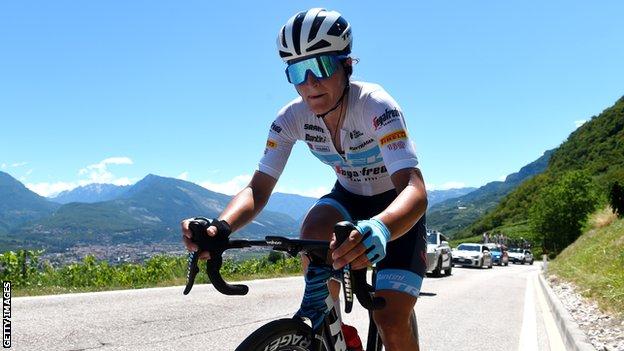
The Tour de France Femmes begins in Paris on July 24 and finishes atop La Planche des Belles Filles on July 31.
While there have been variations of the event over the years until 2009, the new eight-stage race is the first time since 1989 the race has officially been held and hosted by the men’s Tour de France organisers.
The route features a mix of flat stages, hilly courses, gravel and ends with two mountain top finishes in the Vosges where the winner of the coveted yellow jersey will be crowned.
Trek-Segafredo’s Italian rider Elisa Longo Borghini, one of the contenders for the overall victory, talks BBC Sport through the race route and where the title could be won and lost.
Sunday July 24 – stage 1: Paris Tour Eifel – Champs Elysees, 82km
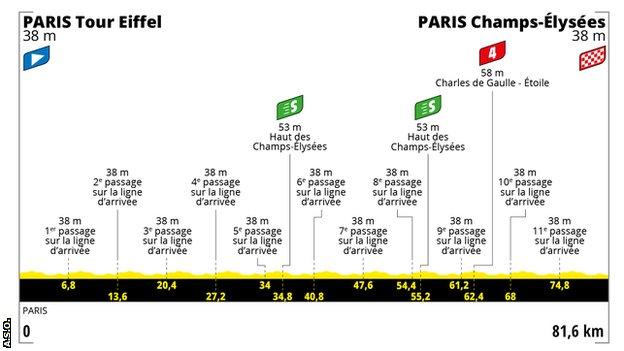
The opening stage of the race follows the familiar route around the Champs-Elysees in Paris, as seen in the men’s Tour de France and three editions of La Course by Le Tour de France between 2014-16.
The peloton will complete 11 laps of the 6.8km loop, passing the Jardin des Tuileries and Place de la Concorde, before racing up and down the cobbled boulevard towards the Arc de Triomphe.
“I think it will be a very nice start,” says Longo Borghini, 30. “It’s going to be charming because the men will finish and then we will take over and start our race. All the media will be there and it’s going to be a cool event.
“The expectation is a sprint finish. We’ve raced here three times but it’s not all a flat circuit. The cobbles makes it very hard.
“All the teams that have a sprinter would like to keep the race tight and the peloton together. But it’s going to be hard because there will be big attacks and in the end it’s going to be like a tough criterium.”
Monday July 25 – stage 2 July 25: Meaux – Provins, 136.4km
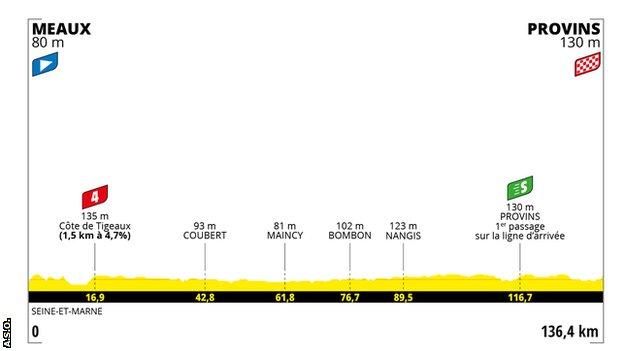
Another flat stage that is likely one for the sprinters, with just one category four climb which comes after only 16km and should not cause any real problems.
The intermediate sprint comes with less than 14km to go, which will give an extra incentive to all the riders and teams with a fast finisher to keep things together and pick up some green jersey points before the finish.
“I think this will be another day for the sprinters. At the end there is a small hill with an intermediate sprint to give the green jersey to somebody.
“I think it’s going to be pretty much controlled by the sprinters teams. They will probably let a small break go and then close it at the end to try and have a bunch sprint.
“For the GC riders it’s a day to spend in the peloton, maybe with a domestique that stays with you and helps you throughout the day in case there are some crashes, any gaps to close.
“A day to save as much energy as you can and to eat and drink and stay relaxed and in the first positions out of trouble.”
Tuesday July 26 – stage 3: Reims – Epernay, 133.6km
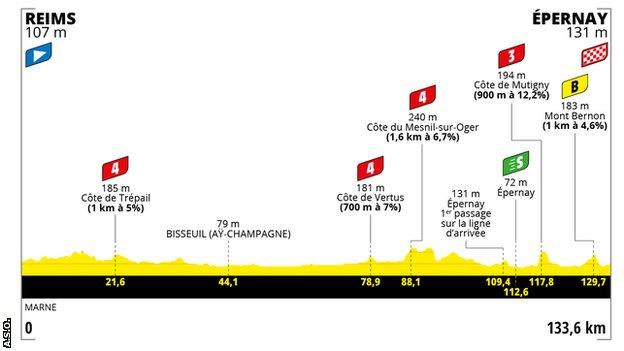
A hard, hilly stage packed with short climbs that finishes in the heart of France’s champagne region.
Eagle eye Tour fans right remember Julian Alaphilippe won a stage on this same finish in 2019 and took the yellow jersey after attacking over the last climb. Chances are the winner here will take the race leaders’ jersey again, too.
Hidden in the profile is a very steep final 500 metres, not too dissimilar to the Mur de Huy we see during Fleche Wallonne or the Cauberg in Amstel Gold Race in the spring classics.
“Stage three looks like an Amstel Gold Race with my eyes. I think the yellow jersey will change hands here.
“I think the race suits a ‘puncheur’ and my favourite would be Lotte Kopecky, Liane Lippert or Grace Brown.
“Also Demi Vollering could be somebody who tries an attack to shake up the GC on the last climb. As I remember it’s only 6km to the finish line afterwards and it’s a very hard climb.”
Wednesday July 27 – stage 4: Troyes – Bar-sur-Aube, 127km
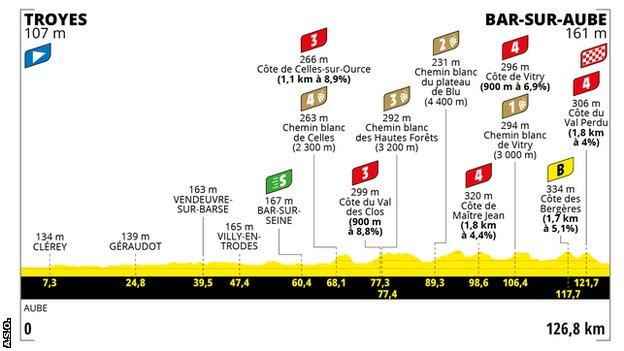
A lumpy stage, featuring five climbs and four sections of gravel packed in the last 60km. Today is a day where the yellow jersey might not be won, but could be lost.
Plenty of riders will see the gravel as a springboard for an attack, yet just as many others will be worried about riding off-road and the pitfalls it might bring.
Not the hardest profile but definitely one of the hardest days.
“Stage four looks like the Italian spring classic Strade Bianche. A lot can happen on this day. Normally at Strade Bianche the white roads come after the climbs; here they come before. It makes it even harder because you have to push harder on the white roads to get over them.
“Everything can happen. It’s going to be really important to have people on the side of the road ready to help you if you have any mechanical, because flat tyres can be just around the corner. I saw some stories on Instagram of riders that went to recon this stage and had many punctures.
“I think that’s when it’s going to be a tricky stage, a stage where you can flick somebody – hopefully not me!”
Thursday July 28 – stage 5: Bar-le-Duc – Saint-Die-des-Vosges, 176km
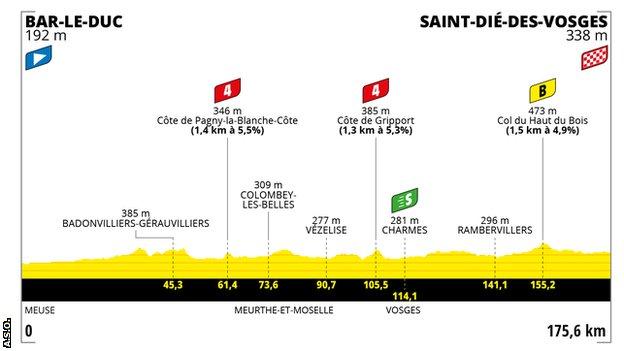
The longest stage of the race as the Tour transitions east towards the Vosges mountains.
This is the last day for the fast women to challenge for victory and it is doubtful the sprinters’ teams will let control slip away.
Organisers have tantalisingly placed a three-second time bonus at the top of the Col du Haut du Bois with 20km to go, however. Whether or not any riders take the bait, attack and try to gain some time, remains to be seen.
“It will be an opportunity for sprinters and a stage where the GC riders will try to use it as a recovery day, try to stay in the peloton in the slipstream, because the last three stages are hard and they build up.
“There is a sprint with bonus seconds towards the end. It will depend on how the race is raced, but I think the last three days will really shake the GC enough so I don’t know who will go and contest them.
“But you never know, there may be some riders who really want the bonuses because they feel more safe to have three seconds going into the very hard stages.”
Friday July 29 – stage 6: Saint-Die-Des-Vosges – Rosheim, 129km
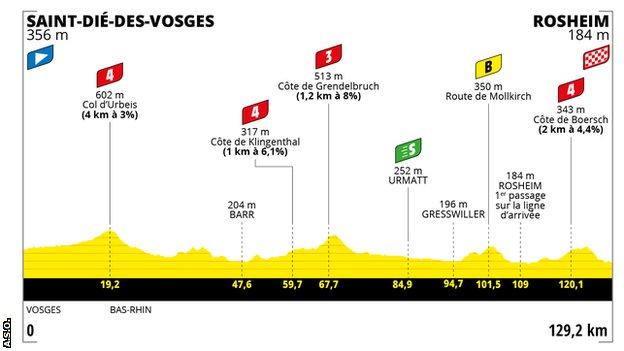
A rolling stage that finishes at the foothills of the Vosges and is peppered with short, sharp climbs suited to puncheurs – riders with explosivity on short, steep hills.
The Col d’Urbeis comes after only 19km and will provide a decent launch for an attack on a day likely to be contested by a breakaway.
There is a 9km descent to the finish in Rosheim after the last climb, something the riders will get to test out twice as the stage loops around the commune.
“The first climb is a good climb to launch an attack and to have a team-mate in a break that can eventually be caught and help you in the final.
“We are doing a kind of circuit at the end and then you can play with numbers. This is a stage where you can use your team very well.
“This is a stage that is for people really looking for a stage win. I always think about Grace Brown because she is a great athlete and these kind of hills suit her very well.”
Saturday July 30 – stage 7: Selestat – Le Markstein Fellering, 127.1km
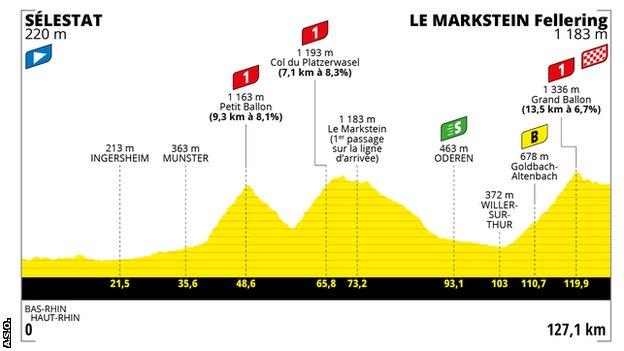
The first of two big mountain stages where the winner of the yellow jersey will be decided.
After a flat opening 35km the riders tackle the Petit Ballon, Col du Platzerwasel and Grand Ballon back-to-back in a saw-tooth profile that offers no respite.
The Petit Ballon begins with a 10% gradient, while the Grand Ballon is both the longest climb of this year’s race – at 13.5km – and also takes us to the highest point of the race. It is a day for pure climbers where there will be nowhere to hide.
“On paper I really like stage seven but I think I’ll be pretty done by the end of the day.
“I think you will see fireworks on the Grand Ballon from the climbers and the GC riders.
“It’s going to be a very, very hard race and I think it’s going to be fought from the beginning.
“I see a breakaway going away, with some domestiques from big teams and then the favourites moving up and getting the help from them. If you are alone in the valley for 20 kilometres then it’s a long way to get to the top of the Grand Ballon.”
Sunday July 31 – stage 8: Lure – La Super Planche des Belles Filles, 123.5km
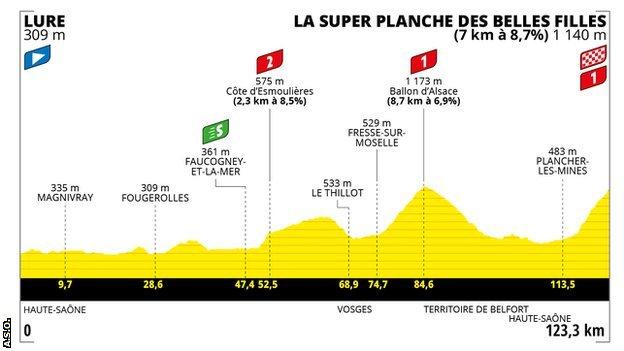
La Planche des Belles Filles has been a popular inclusion in the men’s Tour since its debut in 2012 and its slopes provide a tantalising showdown for the return of the Tour de France Femmes.
The riders have to traverse two other mountains before La Planche, but this stage is all about the finale.
Organisers have saved the steepest climb of the race for last; starting off at 13%, it peaks at a leg-stinging 24% at the top. The final kilometre also includes an unpaved section to really ensure the riders leave nothing on the road.
A place in history awaits whoever takes yellow at the finish line.
“This is a stage where you probably don’t win the Tour de France, but you lose it.
“If you’re tired and you spent a lot of energy the day before, and you are not 100%, then you really risk to lose it at the beginning of La Planche.
“I’ve ridden it and raced on it during the 2015 Route de France. It’s a climb that doesn’t forgive anyone. The last bit is so steep it’s like everyone is going to be rock climbing.
“What I really like from this Tour de France is it’s very open, until the last day. You can’t really relax and it’s going to be a full fight for eight days.”
Interview by Sophie Hurcom
